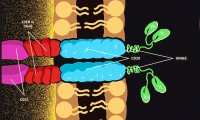-
Takeda and Noile-Immune Biotech Collaborate to Advance Next Generation CAR-T Cell Therapy Effective for Solid Tumors
- Source: Takeda
- 881
- September 6, 2017
-
Over 5.7 billion! China’s dual antibody ADC goes global+1
- Source: drugdu
- 33
- November 21, 2024
-
Celltrion expands European market, acquires iQone Healthcare for 30 billion
- Source: drugdu
- 32
- November 20, 2024
-
Pumis announces equity acquisition agreement with BioNTech
- Source: drugdu
- 44
- November 19, 2024
-
A “dark horse” has emerged in breast cancer treatment
- Source: drugdu
- 36
- November 19, 2024
-
Four innovative pharmaceutical companies have completed a new round of financing! 3 from China
- Source: drugdu
- 51
- November 13, 2024
-
1.82 billion, “China Resources” adds another member
- Source: drugdu
- 47
- November 13, 2024
-
Domestic lupus erythematosus drugs sold for 6 billion!
- Source: drugdu
- 48
- November 12, 2024
-
The “trend” and “newness” behind Roche Pharmaceuticals’ layout of smart healthcare in China
- Source: drugdu
- 49
- November 12, 2024
-
The king of cancer is to be defeated
- Source: drugdu
- 46
- November 12, 2024
your submission has already been received.
OK
Subscribe
Please enter a valid Email address!
Submit
The most relevant industry news & insight will be sent to you every two weeks.













